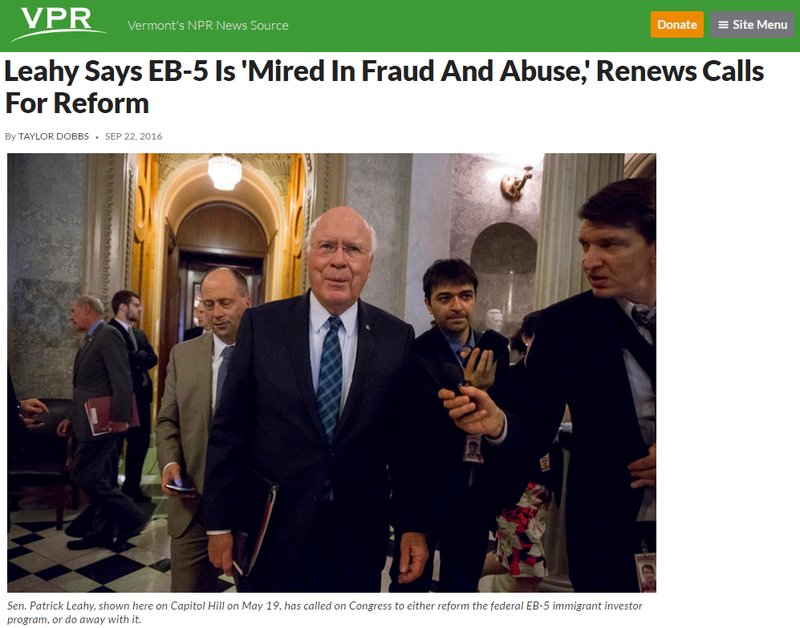Leahy Says EB-5 Is 'Mired In Fraud And Abuse,' Renews Calls For Reform
In a floor speech in the U.S. Senate Thursday, Sen. Patrick Leahy called on Congress to either reform the EB-5 immigrant investor program or do away with it all together.
The program is set to expire this month, and Leahy says it shouldn’t be extended unless reforms are made to prevent fraud and “gerrymandering.”
“If this flawed program is not reformed, I believe it should end,” Leahy said. “I can no longer support a straight extension of the program.”
Vermont’s senior senator has supported EB-5 in the past, but he said Thursday that it has since become “mired in fraud and abuse.”
The EB-5 program is designed to allow immigrants to gain legal residency status in the United States if they make a job-creating investment of at least $500,000 in an economically troubled area.
“The very reason I supported this program have been rendered meaningless,” Leahy said. “The program has become an unintended boon for the wealthiest business districts in the country. Affluent areas now dominate the program. They exploit incentives that were intended for underserved areas, a practice that Department of Homeland Security Secretary [Jeh] Johnson has rightly described as gerrymandering.”
Leahy pointed out another problem with the EB-5 program that, for him, is closer to home.
"In recent years, EB-5 has become riddled with fraud." - Sen. Patrick Leahy
“In recent years, EB-5 has become riddled with fraud. Review after review conducted by the [Government Accountability Office], the inspector general, and by Senator Grassley and I on the Judiciary Committee, we’ve revealed serious vulnerabilities in the program,” he said. “Investors have been defrauded. They’ve lost money. Immigration benefits have been put in jeopardy, and communities that once hoped to benefit from this program have been left to pick up the pieces.”
Earlier this year, the Securities and Exchange Commission (SEC) alleged that Jay Peak CEO Bill Stenger and owner Ariel Quiros engaged in major fraud, including hundreds of millions of dollars of investor money being misappropriated and used for expenses totally unrelated to the projects investors thought they were funding. The SEC alleged that Quiros bought a $2.2 million condo in Trump Place in New York City with investor money.
Stenger has since agreed to a settlement with the SEC.
Leahy has been pushing for reforms to EB-5 for years. Soon after the Jay Peak fraud allegations were made public, Leahy reiterated his call for reforms of the program and said he felt “betrayed” by Stenger and Quiros.
Clarification 12:46 p.m. This story was edited to reflect that Leahy has been in favor of EB-5 reform since before this year's fraud allegations at Jay Peak.
http://digital.vpr.net/post/leahy-says-eb-5-mired-fraud-and-abuse-renews-calls-reform#stream/0
Mentions
- Vermont EB5 Regional Center
- UNITED STATES SECURITIES AND EXCHANGE COMMISSION
- Ariel Quiros
- Bill Stenger
- Patrick Leahy
- Chuck Grassley
Litigation Cases
- State of Vermont vs Bill Stenger & Ariel Quiros
- UNITED STATES SECURITIES AND EXCHANGE COMMISSION vs Ariel Quiros & Bill Stenger
States
- Vermont
Securities Disclaimer
This website is for informational purposes only and does not constitute an offer or solicitation to sell shares or securities. Any such offer or solicitation will be made only by means of an investment's confidential Offering Memorandum and in accordance with the terms of all applicable securities and other laws. This website does not constitute or form part of, and should not be construed as, any offer for sale or subscription of, or any invitation to offer to buy or subscribe for, any securities, nor should it or any part of it form the basis of, or be relied on in any connection with, any contract or commitment whatsoever. EB5Projects.com LLC and its affiliates expressly disclaim any and all responsibility for any direct or consequential loss or damage of any kind whatsoever arising directly or indirectly from: (i) reliance on any information contained in the website, (ii) any error, omission or inaccuracy in any such information or (iii) any action resulting therefrom.




